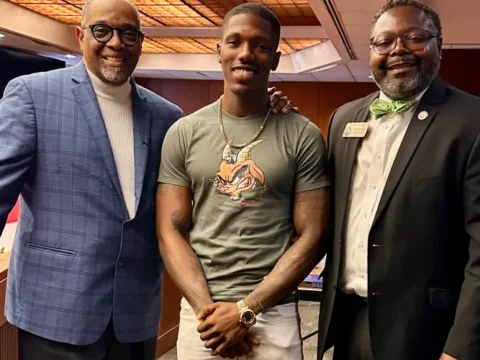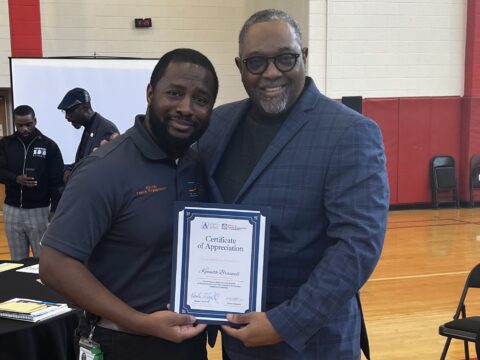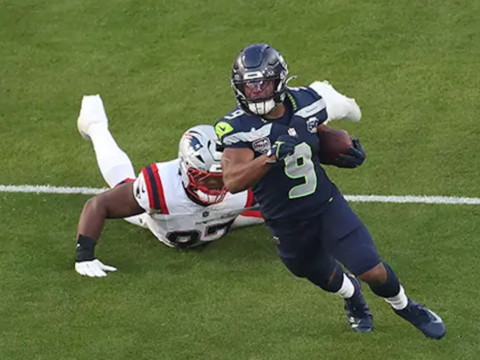When someone reduces a lifetime of bruises, breakthroughs, and back-against-the-wall prayers to a free consultation (“Can I pick your brain?”), it’s not a minor oversight. It’s an act of quiet theft, and every theft of value chips away at joy.
By Kenneth Braswell
When scrolling through LinkedIn recently, a post from Dr. Charles R. Rogers stopped me in my tracks. His words — sharp, compassionate, unapologetic — made my proverbial baby leap, the way Elizabeth felt John kick at the mere sound of Mary’s greeting (Luke 1:44). In an instant, joy, conviction, and a warning rose together in my chest.
If your idea of collaboration starts with ‘Can I pick your brain?’ but ends with me being unpaid, uncredited, and unprotected, was it ever collaboration at all?
— Dr. Charles R. Rogers
That sentence landed with the weight of a stone tablet. Because when someone reduces a lifetime of bruises, breakthroughs, and back-against-the-wall prayers to a free consultation, it is not a minor oversight. It’s an act of quiet theft, and every theft of value chips away at joy.
The Hidden Bill Nobody Sees
Too often, the reach-outs arrive dressed in flattery: “Love your work, Brother. Got just a quick question!” Somewhere in the exchange, you realize that nothing about the ask is quick, and the asker is not interested in reciprocity.
They need a shortcut. Your 21 years of trench work at Fathers Incorporated — your late-night grant rewrites, the board meetings that stretched you, the tears only God and your family witnessed — are being requisitioned to patch holes in someone else’s résumé.
The dynamic is subtle. The asker may not intend harm, but intent does not erase impact. Every time you downplay my worth, you echo a lie I’ve spent decades disproving: “Your lived experience is ordinary. Your voice is optional.”
Joy on a Diminishing Ration
Devalue a man long enough and watch how his joy recalibrates downward. A friend once confessed, “The moment they asked me to speak without an honorarium, my smile dimmed, and I didn’t know why.” But I knew why: Joy starves when worth goes unfed.
Pastor Sarita Jakes gave me language for this years ago. She told me to discern between people who want to be like you and people who want to be you. The first group admires the fruit of your labor; the second tries to graft themselves onto your tree, hoping no one sees the splice. Admiration can inspire. Appropriation plunders.
Familiarity, Contempt, and the Facebook Friend Illusion
There’s a reason the proverb says a prophet finds no honor in his hometown. Familiarity blurs greatness into background noise. Social media turbocharges that blur. Today, a “friend” can be anyone who once clicked Accept. They may know the city you live in, the school your children attend, and what you ate last night, but they don’t know the season-grinding process that shapes your purpose.
So they message, “Hey, can we hop on a call? I just need your insight on this small project.” Small — until you realize the “project” is the very thing God assigned to your hands, the thing that keeps your calendar clogged and your heart awake at 3 a.m. They want the harvest without experiencing the drought.
Capacity Is Sacred Ground
In his LinkedIn post, Dr. Rogers offered three elegant refusals, and I’ve taped them near my laptop:
- Boundary + Resource Redirect: “I’m at capacity for unpaid calls, but here are resources that may help.”
- Honest Decline: “I don’t have the bandwidth to support this right now.”
- Paid Expertise Pivot: “That falls within my consulting work. May I send my rates and availability?”
Notice what each stance protects: time, sanity, and the unseen commitments that make greatness sustainable. Every “yes” we lend without discernment is a “no” to our families, our peace, and the next revelation waiting to advance our work.
Choosing Your Circle: A Christ Model
Scripture records crowds pressing Jesus on every side, yet He chose 12 for discipleship and even fewer for intimate moments. Purpose, role, and responsibility — never mere familiarity — guided His selections. If the Son of Man could curate proximity, so can we.
The Kendrick Lamar hook “They not like us” isn’t arrogance: It’s awareness. Some are traveling a parallel road; others are hitchhiking, thumbing a ride to your destination with no intention of paying for gas. Wisdom is knowing the difference and locking the car doors accordingly.
A Call to Mutual Honor
To everyone who has ever typed “Can I pick your brain?” with no plan to honor the mind behind it, I invite you to try these alternatives:
- “I value your expertise and have set aside a budget for consultation. How might we work together?”
- “I’ve done initial research and still need guidance. Here’s my prep. May we schedule paid time?”
- “Our team would like to credit your contribution publicly and compensate you fairly.”
And to my fellow givers, remember this: Boundaries are not barriers to blessings. Boundaries are irrigation lines that channel life-giving water where it’s needed. Guard them. Adjust them. Open them when led, and close them when drained.
The Joy Returns
When value meets acknowledgment — when collaboration includes credit, compensation, and protection — joy overflows again. My baby leaps. Your baby leaps. Ideas dance like David before the Ark because they know they are safe in responsible hands.
I don’t write this to indict; I write to illuminate. The harvest ahead in fatherhood work, health equity, or any mission worth sweating for is too vast to tackle alone. We need each other’s brilliance, but partnership must be covenant, not convenience.
So let’s covenant. Let’s build tables where lived experience is currency, wisdom is safeguarded, and generosity flows in both directions. Anything less is just another shortcut masquerading as collaboration.
And I, for one, have run out of shortcuts to give away for free.
















